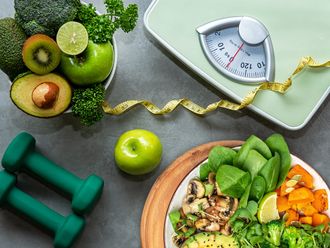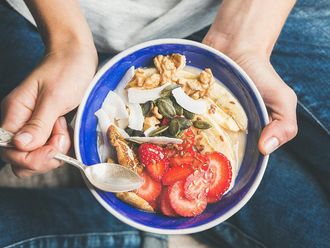
Ultra-processed foods have slipped into our lives unnoticed. Its convenience, taste, texture and colour have seduced us. Your breakfast cereal is one. Packaged bread too falls into the category. So is orange juice, if it came in a pack. Honey and jam too. Even yoghurt. The list is endless. Anything not straight out of the farm in original form is processed food.
Processed food is a reality in modern lives, where time is scarce. Minimally processed foods are easy to store, and there’s no change in nutritional content. Processed foods have added ingredients to improve the flavour and texture. Ultra-processed or highly processed foods are mass-produced with cheap ingredients, and that’s the problem.
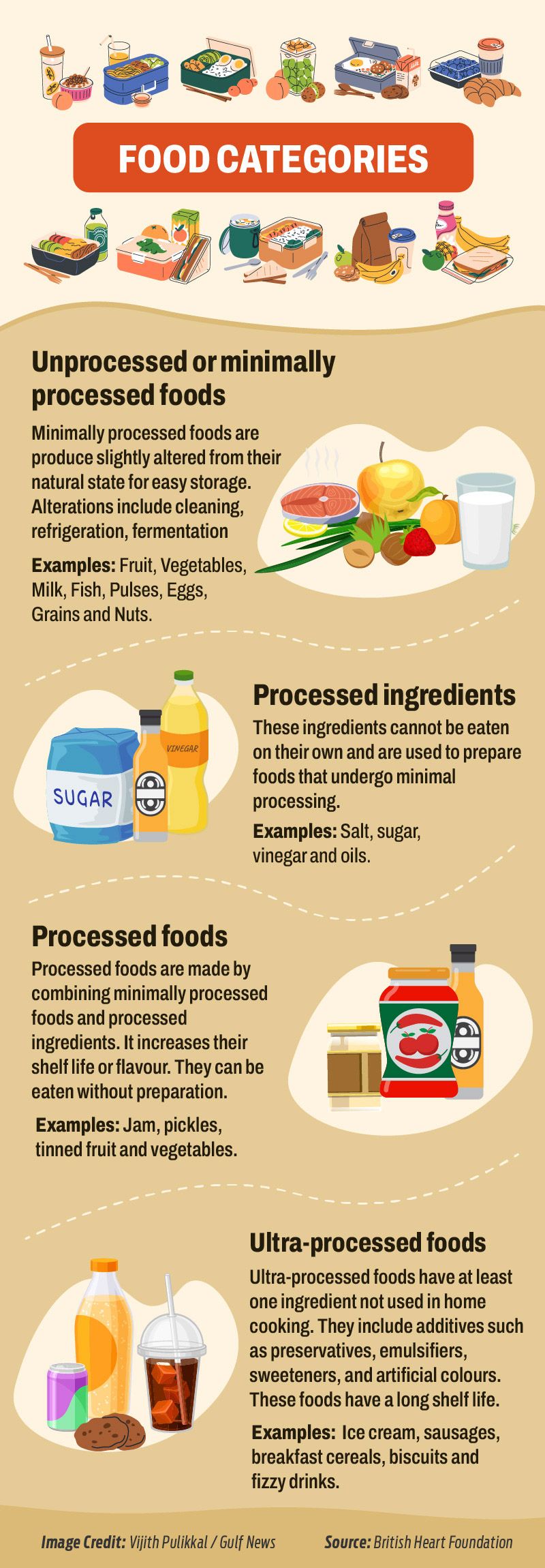
Why’s highly processed foods a problem? They undergo so much processing to improve taste and texture that the food has little resemblance to the one sourced from the farm. With sales at the heart of the operation, the addition of artificial sweeteners, synthetic colours, preservatives, emulsifiers and other additives make them popular.
“Their textures and colours are often engineered to appeal to our senses, which can make them hard to resist. They often contain sugars, artificial ingredients, and chemicals that create cravings, leading to frequent consumption,” says Mona Joumaa, Lead Dietitian at Mediclinic Parkview Hospital, Dubai, adding that aggressive marketing strategies increase the consumption of highly processed foods.
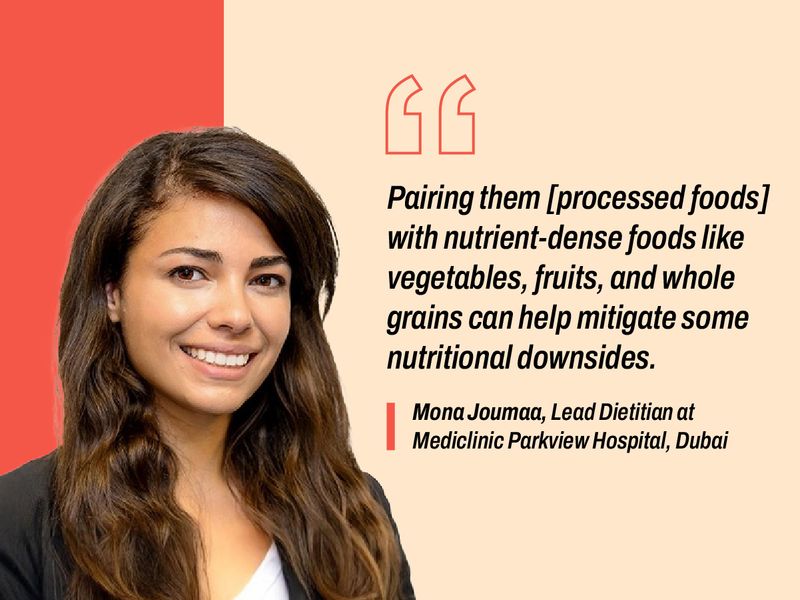
Fizzy drinks, cookies, chips, breakfast cereals, pizzas, pastries, readymade meals, luncheon meats, flavoured yoghurt, instant soups and such food are among the highly processed foods. Some of these ready-to-eat stuff can be addictive, and the craving bumps sales.
Their popularity stems from their unmatched convenience — you can grab a snack or meal ready to eat in minutes, says Hooriya Farook Badiuddin, Clinical Dietitian at Medeor Hospital in Dubai. “Their long shelf life means you don’t have to worry about them spoiling quickly. The marketing around these foods highlights their affordability and great taste, making them a go-to choice for many. In a fast-paced world, they fit perfectly into our on-the-go routines.”
How highly processed food impacts health
The problem is the effect on health. When made flavourful, nutrition becomes a casualty, and food ceases to be food. It can no longer sustain or nurture life without being detrimental to health in the long run. Some research suggests that a diet high in these foods may be linked to mental health issues, like increased anxiety and depression.
“Many of them are loaded with added sugars, unhealthy fats, and high levels of sodium, which can lead to chronic conditions like heart disease, diabetes, and high blood pressure. They usually lack the essential nutrients and fibre our bodies need to function optimally,” says Hooriya.
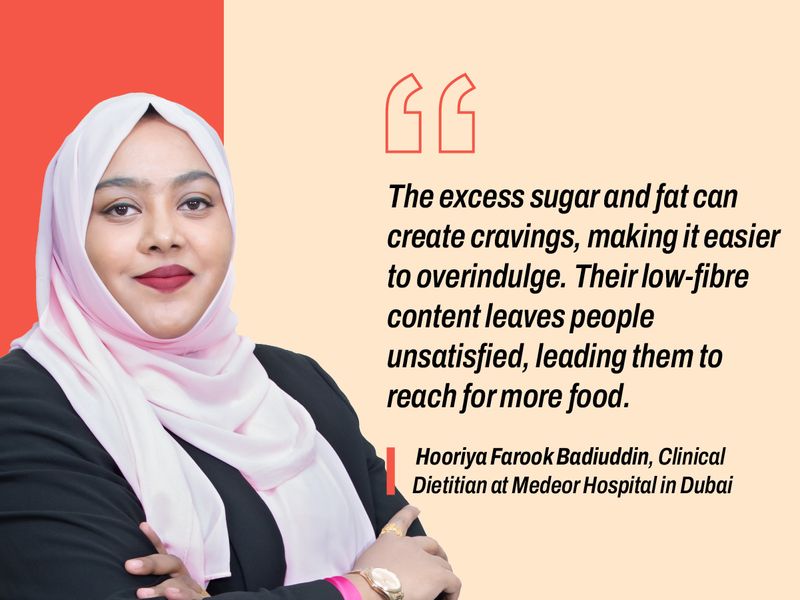
Mona says the impact on gut health is crippling. “The presence of harmful substances like advanced glycation end products (AGEs) and carcinogens from high-temperature cooking methods increases the risk of cancer and accelerated ageing. Overconsumption can also affect mood, energy levels, and even gut health, as some additives and artificial ingredients may disrupt healthy gut bacteria,” the Lead Dietitian at Dubai’s Mediclinic Parkview Hospital adds.
Obesity is another side effect of excessive intake of highly processed foods. Hooriya says since these foods are often high in calories and low in nutrients, you can eat a lot without feeling full. “The excess sugar and fat can create cravings, making it easier to overindulge. Their low-fibre content leaves people unsatisfied, leading them to reach for more food. It’s a vicious cycle that can derail healthy eating habits,” the Medeor Hospital dietitian adds.
Mona concurs and says consuming highly processed foods can disrupt hunger and fullness cues, leading people to consume more calories than needed. “White flour products with added sugars cause a rapid increase in blood sugar, lacking fibre, nutrients, or beneficial plant compounds. This spike in blood sugar triggers a large release of insulin, a hormone that can promote the growth of fat cells,” says the Lead Dietitian at Mediclinic Parkview Hospital.
Sharon James, Health and Wellness coach, says consuming processed foods can heighten inflammatory responses. “As a menopause coach, I view processed foods as a significant contributor to inflammation, which can worsen menopausal symptoms. During menopause, hormonal changes already increase the body’s inflammatory response, often leading to symptoms like hot flashes, joint discomfort, and mood swings.”
Despite the downsides, ultra-processed foods are here to stay. More so since people juggle home, office and children. The trick is to incorporate them judiciously into the daily diet by reducing the impact on health.
How to add processed food to your diet
Mona says balance is the key. “Pairing them [processed foods] with nutrient-dense foods like vegetables, fruits, and whole grains can help mitigate some nutritional downsides. Practising portion control and choosing minimally processed options (such as whole-grain crackers or minimally processed peanut butter) can also help manage their impact on health. For example, adding a handful of potato chips (crisps) on top of a fresh Mexican salad made out of lettuce, beans, corn, cherry tomatoes, grilled chicken and shredded aged cheese, rather than consuming a full bag of fried potato chips,” she adds.
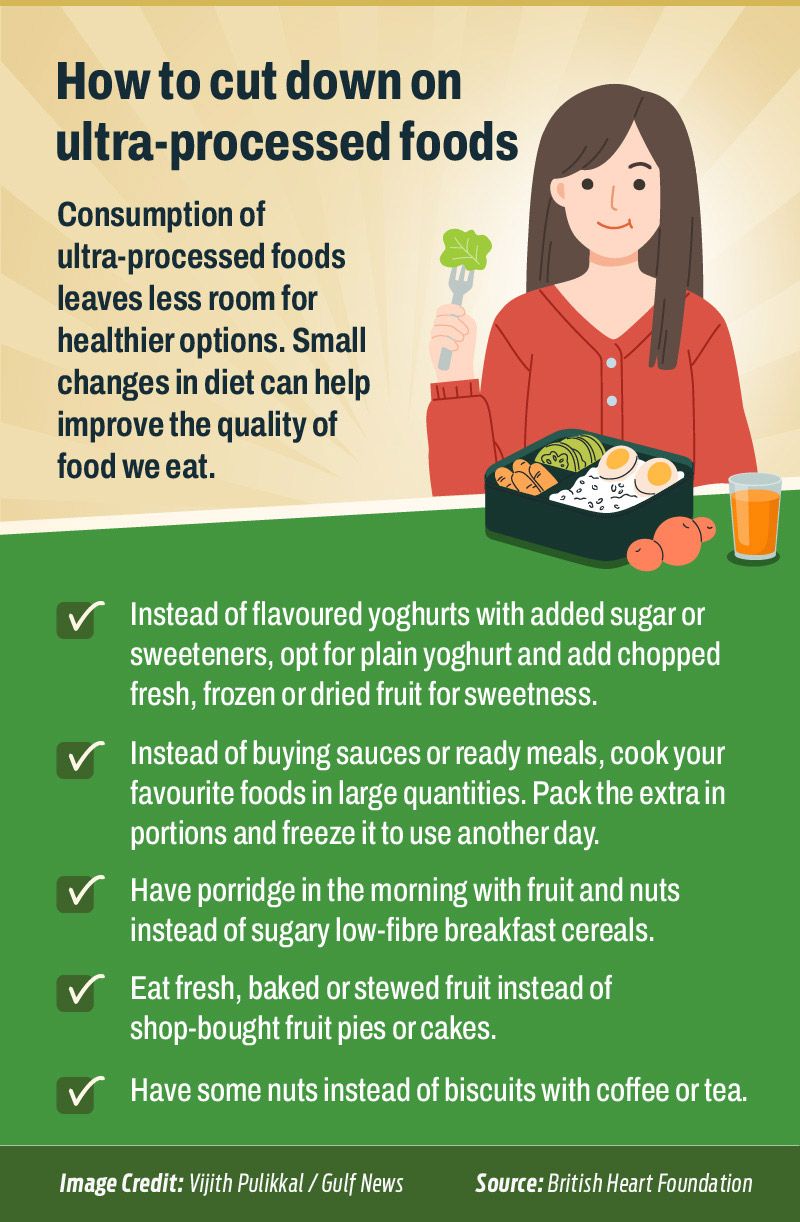
Hooriya insists on moderation. “Opt for healthier options — think whole grain bread, low-sugar yoghurts, or frozen fruits and veggies without added sugars. Pair these with whole foods like fresh fruits, veggies, lean proteins, and healthy fats to create balanced meals,” adds the Dubai-based dietitian.
The lure of highly processed food is inescapable, but there are ways to work around them. Hooriya says some planning can help make mindful choices instead of relying solely on convenience. “Fresh fruits and vegetables, whole grains like quinoa and brown rice, lean proteins such as chicken or beans, and healthy fats from avocados and nuts are great options.”
What are the alternatives to processed food?
Mediclinic Parkview Hospital’s Lead Dietitian Mona suggests whole foods as the best alternative. “Fresh fruits, vegetables, lean proteins, whole grains, and healthy fats provide essential nutrients without the added chemicals found in processed foods. For quick snacks, options like nuts, yoghurt, and fresh fruits are healthier.”
Nothing beats homemade meals. They are not just delicious; every ingredient that goes into the food is within our control. No flavour enhancers, artificial colouring or preservatives.
“Cooking at home with whole ingredients provides delicious meals that are satisfying and nutritious, says Hooriya. “Preparing meals at home, where ingredients can be controlled, helps, adds Mona.

What research says
The British Heart Foundation used three studies to highlight the association between high intake of ultra-processed foods and adverse health outcomes. Other factors could also be responsible, but this hasn’t been proven. Here are the three studies and their findings.
A study that tracked 10,000 Australian women for 15 years showed that people who consumed the highest amounts of ultra-processed food were 39 per cent more likely to develop high blood pressure than those with the lowest.
An analysis of 10 studies involving more than 325,000 men and women showed that those who ate the most ultra-processed food were 24 per cent more likely to suffer serious health issues, including heart attacks, strokes and angina.
A study of 19,899 university graduates in Spain linked ultra-processed foods to the risk of early death. People with the highest intake were 62 per cent more likely to have died after around 10 years than people with low consumption.
What if you can’t avoid processed foods
These studies show that highly processed foods are best avoided. However, other studies suggest that some health problems may be caused by excess calorie consumption rather than the hyper-processing of food.
In a world where food insecurity is real, processed foods can help alleviate hunger if they are fortified with nutrients. So the move to improve the quality of ultra-processed foods with vitamins and minerals is a giant leap. More so since these foods have made their way into our homes.
Moderation and balanced use of highly processed foods will go a long way in keeping meals nutritious despite the time crunch. So long as whole foods are not dumped in favour of highly processed foods, health won’t be compromised. We need to watch what we eat. After all, food is medicine.


